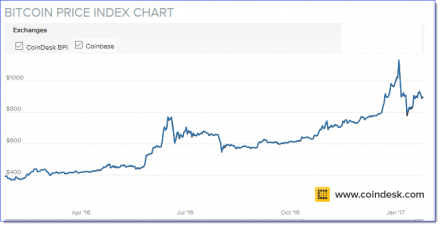Bitcoin, which appeared on the world stage in 2008, is a multi-faceted phenomenon: it is a technology, a currency, an investment vehicle and it has created a community of users. And, like many fintech (financial technology) innovations over the last decade, the Bitcoin digital currency has provided a disruptive alternative to traditional currency-based financial methods and institutions.
A Bitcoin Primer
In a nutshell, Bitcoin is a peer-to-peer system for online payments & transactions that does not require a trusted central authority such as PayPal, banks, credit card companies, etc. The various elements that, together, comprise the Bitcoin protocol are [1] [2] [3]:
- Programmers – who donate their time developing the open-source Bitcoin software (subject to approval of lead developer Gavin Andresen).
- Users (“miners”) – who install the Bitcoin software and pool their computers’ processing power to verify and process a transaction by solving complex math problems. New Bitcoins enter circulation as “miner” rewards that are proportional to the computing power they donate to the network in creating a “block”, i.e. an encrypted Bitcoin transaction. NOTE: In order to slow down the rate at which new Bitcoins are introduced, the math problems become increasingly harder and the rewards are cut in half at regular intervals.
- The block chain – a shared public ledger that includes all confirmed transactions. The integrity and chronological order of the block chain is enforced through cryptography.
- Private keys – a secret piece of data used to sign a transaction between Bitcoin wallets. They are critical to providing proof that the Bitcoin being offered is legitimately owned and to ensuring a transaction cannot be altered once it has been issued.
These checks and balances make it virtually impossible for anyone to manipulate the Bitcoin system.
The Growing and Enduring Impact of Bitcoin
Bitcoin can either be used to buy things online from a growing list of merchants and organizations that accept Bitcoin, or it can be cashed through an exchange, broker, or direct buyer.[3] From the outset, a built-in limit of 21 million Bitcoins was established and as of early January 2017, about 16 million Bitcoins were in circulation. As shown in the graph below (based on two of the major Bitcoin online exchanges), the Bitcoin price has more than doubled from $394 on January 27, 2016 to $896 on January 25, 2017. When the price peaked in early January at around $1,130, the Bitcoin market cap was $17.56 billion.
 As can be expected, other crypto-currencies have been launched to compete with Bitcoin. Key players, however, predict that as long as Bitcoin continues to remain a robust, dynamic open software platform, it will likely remain the leader since the cost of migrating miners to other competing technologies would be very high.[5]
As can be expected, other crypto-currencies have been launched to compete with Bitcoin. Key players, however, predict that as long as Bitcoin continues to remain a robust, dynamic open software platform, it will likely remain the leader since the cost of migrating miners to other competing technologies would be very high.[5]
Managing Bitcoin Abuse
Because Bitcoin transactions are done using public keys, the identities of the buyers and sellers are unknown to each other and to the public. In addition, Bitcoin transactions cut out middlemen like banks or clearinghouses. Although this significantly reduces the cost, duration and complexity of global transfers, these same middlemen also play an important regulatory role in preventing illicit activities such as money laundering and tax evasion.[3]
Given the fact that Bitcoin (and other crypto-currencies) are here to stay and given Bitcoin’s inherently unregulated and pseudonymous nature, regulators and law enforcement officials are seeking innovative ways to reduce the risk of abuse. Thus, for example, last week (16-18 January 2017) 400 participants from law enforcement agencies and private industries from 60 countries gathered in Qatar for the Digital Currencies & Money Laundering conferenced hosted by INTERPOL.
As noted by Tim Morris, INTERPOL’s director of Police Service “Digital currencies are not constrained by national regulations or borders, therefore cooperation in fighting against criminal uses of digital currencies must also transcend borders and integrate solutions from both law enforcement and private sector.”[6]
In October 2015, the European Union took the important step of harmonizing the tax treatment of Bitcoin transactions, since Bitcoin was considered digital money in some countries and a commodity in others. And earlier this month, the European Parliament proposed a directive that would require crypto-currency exchanges and wallets to identify suspicious activity as part of the general directive on preventing money laundering and terrorist financing.[7]
A first regulatory response in the US was New York’s BitLicense that was adopted in June 2015. BitLicense aims to regulate virtual currencies by regulating the Bitcoin commercial operators as if they were regular financial operators or money transmitters – requiring them to comply with anti-money laundering, know-your-customer, and other money transmission laws and regulations.
Finding the Regulatory Balance: An Ongoing Effort
Recently Coinbase, a prominent digital asset exchange company, was served a subpoena by the IRS to disclose records on all its US customers. Coinbase’s response is that seeking transaction information on so many customers only because they use virtual currency is a violation of their privacy. If the IRS were to approach PayPal, Fidelity or Citibank with such a request, those companies would rightfully object. At the same time, however, Coinbase is fully and publicly committed to complying with tax reporting requirements and has suggested solutions such as issuing an annual summary of digital asset trading gains and losses rather than extensive transaction records.
The ongoing challenge will be to figure out how to regulate Bitcoin in a way that does not impinge upon the benefits that blockchain technologies provide in terms of efficiency, transparency, accountability and consumer protection.
References
[3] Rebecca Grant, Bitcoin for Idiots, Venture Beat, February 17, 2014
[4] Samburaj Das, Bitcoin’s Market Cap Crosses $17.5 Billion, January 4, 2017
[5] Javier Hasse, 2017: The State of Cryptocurrencies (Part 2), Benzinga, January 24, 2017
[6] Samburaj Das, INTERPOL Hosts Digital Currencies & Money Laundering Conference in Qatar, 20/01/2017
[7] Lester Coleman, BBVA Economist: Legal Framework Needed for Blockchain Technology, January 15, 2017
[8] Primavera De Filippi, We Must Regulate Bitcoin. Problem Is, We Don’t Understand It, March 1, 2016
[9] Lester Coleman, Coinbase CEO Asks IRS to Work Together toward Mutual Goals, January 17, 2017


